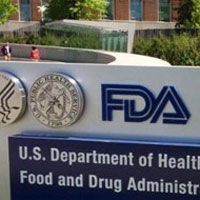Another Immunotherapy Drug, Avelumab, Approved to Treat Bladder Cancer
The FDA has granted accelerated approval to avelumab (Bavencio) for the treatment of patients with locally advanced or metastatic urothelial carcinoma.
Another Immunotherapy Drug, Avelumab, Approved to Treat Bladder Cancer

The FDA has granted an accelerated approval to the PD-L1 inhibitor avelumab (Bavencio) for the treatment of patients with locally advanced or metastatic urothelial carcinoma with disease progression during or following platinum-containing chemotherapy, or within 12 months of neoadjuvant or adjuvant platinum-containing chemotherapy.
The approval was based on data from the urothelial carcinoma cohorts of the single-arm, open-label JAVELIN Solid Tumor trial, in which the overall response rate was 13.3% (95% CI, 9.1-18.4) among 226 patients who had been followed for at least 13 weeks, and was 16.1% (95% CI, 10.8-22.8) among 161 patients who had been followed for at least 6 months.
In the ≥6-month follow-up cohort, the 26 responses included 9 (5.6%) complete responses (CRs) and 17 (10.6%) partial response (PRs). In the ≥13 weeks follow-up group, the 30 responses included 9 CRs (4%) and 21 PRs (9.3%).
The median duration of response had not yet been reached for either group and ranged from 1.4+ to 17.4+ months for both groups. The median time to response was 2 months (range, 1.3-11.0).
PD-L1 expression was evaluation in 84% of patients across both cohorts. Among this group, there was no distinguishable variation in response rates based on tumor expression levels of PD-L1.
The JAVELIN trial included 242 patients with locally advanced or metastatic urothelial carcinoma with disease progression on or after platinum-containing chemotherapy or who had disease progression within 12 months of treatment with a platinum-containing neoadjuvant or adjuvant chemotherapy regimen.
The median patient age in the ≥13 weeks follow-up group was 68 years (range, 30-89), 72% were male, and 80% were white. The ECOG performance status was 0 and 1 for 34% and 66% of patients, respectively.
Four percent (9/226) of patients had progressed after prior platinum-containing neoadjuvant or adjuvant therapy only. Twenty percent of patients had received prior cisplatin and carboplatin-based regimens, 47% had only prior cisplatin-based treatment, and 32% had only prior carboplatin-based treatment. Liver metastases were reported in 34% of patients at baseline, and 17% of patients had hemoglobin below 10 g/dL.
Avelumab was administered at 10 mg/kg intravenously every 2 weeks until progression or unacceptable toxicity. Prior to each avelumab administration, all patients received an antihistamine and acetaminophen.
The most common all-grade adverse events (AEs) were fatigue (41%), infusion-related reaction (30%), musculoskeletal pain (25%), nausea (24%), decreased appetite (21%), and urinary tract infection (21%).
The most frequent serious AEs were urinary tract infection/urosepsis, abdominal pain, musculoskeletal pain, creatinine increased/renal failure, dehydration, hematuria/urinary tract hemorrhage, intestinal obstruction/small intestinal obstruction, and pyrexia. AE-related deaths occurred in 6% of patients.
Key Advances in Cancer Survivorship Toxicity Management
July 15th 2022In this episode of The Vitals, Lidia Schapira, MD, FASCO, recounts highlights from the 2022 ASCO Symptoms and Survivorship track and underscores key takeaways for practitioners seeking to enhance the delivery of cancer survivorship care.



